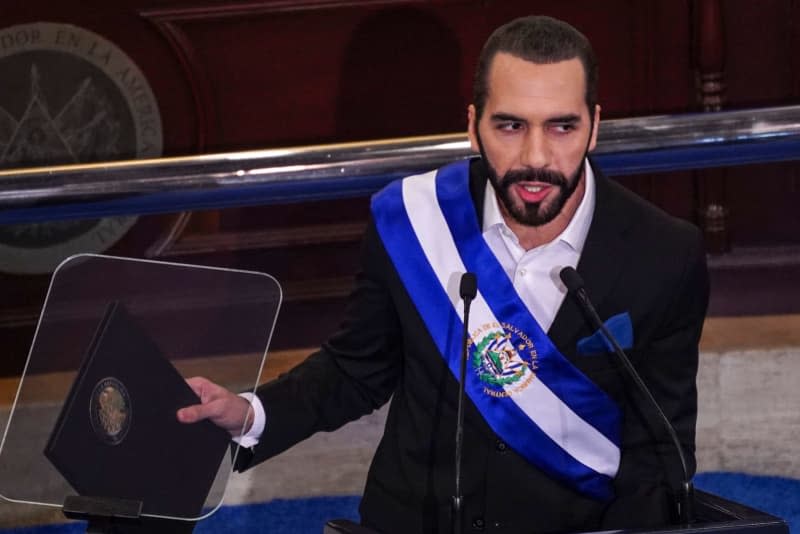El Salvador's electoral court confirms President Bukele as winner

- Oops!Something went wrong.Please try again later.
El Salvador's Supreme Electoral Court announced late on Sunday evening that incumbent president Nayib Bukele is on the verge of a clear victory in the presidential and parliamentary elections, with just under 83% of the vote.
The 42-year-old had already declared himself the winner of the presidential election in the Central American country, while the votes were still being counted - and despite the fact that under the constitution he would theoretically not be allowed to run for a second term in office.
His Nuevas Ideas (New Ideas) party had also won at least 58 of the 60 seats in parliament, he wrote on the online platform X, formerly Twitter.
Thousands of cheering supporters gathered shortly afterwards to celebrate in front of the National Palace in the capital San Salvador.
Around 6.2 million citizens were called to vote in the presidential and parliamentary elections, including 741,000 Salvadorans living abroad.
In a press conference, Bukele rejected the accusation that his country was ruled autocratically and that innocent people were imprisoned en masse.
"El Salvador was the murder capital of the world," said the former advertising consultant. Now it is the safest country in the western hemisphere, he said, adding that the election result clearly expresses the will of the Salvadoran people.
Bukele had been expected to cruise to a safe re-election, with pre-vote opinion polls indicating that he was likely to be returned to office with a large majority.
His successful but controversial crackdown on criminal gangs that had terrorized the Central American country for decades was seen as key to his expected electoral success. As crime fell, Bukele's popularity soared.
But critics warn of an increasingly authoritarian turn taken by the former mayor of San Salvador, who has been president since 2019.
They point to undemocratic policies, such as the restriction of civil rights, arbitrary arrests and the erosion of the separation of powers.
Bukele often makes fun of his critics and at times has described himself as the "World's Coolest Dictator" in his profile on X.
The people of El Salvador, the smallest Central American country, have been living under a state of emergency for almost two years. A number of basic rights such as freedom of assembly are restricted.
More than 75,000 suspected gang members have since been arrested, most only on suspicion and without access to lawyers. Videos of thousands of tattooed gangsters being herded into a new high-security prison wearing only white underpants went viral.
El Salvador's constitution actually prohibits the re-election of the president for consecutive terms. However, constitutional judges loyal to the government approved Bukele's candidacy for a second five-year term.
To circumvent the ban, the head of state only has to take a leave of absence for six months - until the day of the planned inauguration on June 1.
There were six presidential candidates on the ballot on Sunday, but Bukele did not have a real challenger.
The right-wing Arena party and the left-wing FMLN, which ruled the country for 30 years until Bukele's 2019 election victory, had been preparing to face a big defeat.
The FMLN's presidential candidate Manuel Flores and Joel Sánchez of Arena had only received less than 5% each in the opinion polls ahead of Sunday's voting.
In June, El Salvador's Congress, which is dominated by the ruling party, reduced the number of seats from 84 to 60 and changed the calculation method for the distribution of seats. The electoral law now favours the majority party when awarding seats in parliament.

